How Do Toys Help Child Development

Have you ever watched a child play and marveled at the mysteries unfolding in their little head? Toys, often dismissed as simple playthings, are, in fact, intricate tools in the journey of child development. The importance of toys in child development is huge. They act as silent teachers, unspoken guides, and steadfast friends, accompanying a child through the crucial stages of growth. From the soft embrace of a teddy bear to the vibrant allure of building blocks, each toy weaves its own story and imparts unique lessons. Join us as we delve into the captivating roles toys play in the rich tapestry of a child’s unfolding growth, shaping their future one playful moment at a time.
Toys Help Children Think
When we think of toys and a child’s development, wooden toys hold a special place, merging timeless charm with educational value. These high-quality, eco-friendly playthings are more than just toys; they are catalysts for cognitive growth and creativity.
Wooden toys play a crucial role in children’s development. With their varied shapes and natural textures, these toys invite children to explore, think, and experiment. Unlike their flashy, noise-making counterparts, these toys are subtly designed, encouraging children to use their imagination to fill in the gaps. In the hands of a child, a wooden block toy transforms into towering structures, sprawling cities, or whatever their creativity conjures up.
Help Children Question
Moreover, these toys are often open-ended, meaning there are no rules, instructions, or right or wrong way to play. This kind of play environment is crucial for cognitive development. It makes children think about the ‘what,’ ‘how,’ and ‘why’ of things. For example, when a child tries to balance one wooden block atop another, they’re not just playing; they’re learning about weight, balance, and gravity.
Sensory Development
Additionally, the tactile experience of wooden toys is fundamentally different from plastic’s. The weight, texture, and solidity of wood engage more senses, grounding the child’s play experience in the physical world. This sensory play is crucial for developing fine motor skills, hand-eye coordination, and a deeper understanding of the world’s natural elements.
Children Learn About Sustainability
Let’s not forget that wooden toys are durable and sustainable, making them an investment in your child’s cognitive development and our planet’s future. They’re toys that help children think and teach them the value of respecting and caring for their environment. In a world where screens often dominate playtime, wooden toys offer a refreshing return to simplicity, encouraging pure, imaginative, and thoughtful play. They prove that the simplest objects can sometimes provide the most complex and enriching learning experiences.
Toys Promote Positive Socialization
Toys aren’t just playthings; they’re powerful tools that promote positive socialization in children. When kids come together to play, they have fun and learn valuable life skills that help them grow and connect with others. Wooden toys, in particular, have a special place in this socialization journey.
The Magic of Doll Houses
Imagine children gathered around a wooden doll house, each taking on a role, playing house, and interacting with miniaturized furniture and dolls. This is more than just pretend play; it’s an opportunity for them to engage, negotiate, and share. They learn cooperation by discussing who plays what character, creating scenarios, and making stories together.
Acting As A Parent
Wooden doll prams (strollers) also play a significant role in this socialization process. Children love to carry their soft toys, dolls, or stuffed animals in these prams, mimicking the roles of parents or guardians. As they push their little companions around, they’re not just having a good time but also learning empathy and responsibility. They practice nurturing and caregiving, which are essential skills for building positive relationships with others.
Help Develop Sharing Habits
The wooden rocking horse encourages socialization as children take turns riding it, sharing excitement, laughter, and stories. It’s a source of camaraderie and adventure, promoting cooperation and patience. As they balance on the horse, kids develop coordination and strengthen their core muscles, all while creating lasting memories together.
Whether it’s a wooden dollhouse, doll prams, or a wooden rocking horse, these toys provide the perfect backdrop for children to come together, bond, and learn vital social skills. They create memories, build friendships, and foster positive socialization that will serve them well throughout their lives. So, choose the best toys for child development that meet the personal taste of your kid.
Toys Spark Creativity
Toys have a magical way of sparking creativity in children. They invite young minds to explore, experiment, and imagine a world full of possibilities. When it comes to fostering creativity, wooden building blocks are among the most versatile and inspiring toys out there.
Imagine a child sitting down with a pile of colorful wooden building blocks. These blocks, featuring various shapes like long H blocks, short H blocks, small planks, long planks, wheels, and pins, are like the building blocks of their imagination. With these simple pieces, they can create a multitude of wonders. They are the perfect educational toys for toddlers.
Wooden Blocks Enhance Cognitive Development
Wooden building blocks are not just shapes but raw materials for creativity. Children can stack them high to construct towering castles, bridges, and skyscrapers. They can arrange them in intricate patterns to design beautiful mosaics or geometric masterpieces.
But it doesn’t stop there. These blocks become the building blocks of stories and adventures. A few well-placed blocks can transform into a fleet of airplanes ready to soar through the skies or a train chugging along on a cross-country journey. They can become the branches of trees in a miniature forest or the inhabitants of a bustling city.
The beauty of wood puzzles toys or cognitive development toys is that they encourage open-ended play. There are no instructions or boundaries, just limitless possibilities waiting to be explored. Children can create new and one-of-a-kind figures, from friendly animals to imaginative robots and even sports gear for their mini athletes. As they assemble, disassemble, and rearrange these blocks, they’re not just building structures; they’re building problem-solving skills, spatial awareness, and a deep appreciation for the power of their own creativity.
When you see a child engrossed in building with wooden blocks, know that they are not just playing; they are creating, innovating, and laying the foundation for a lifelong love of learning and exploration. The impact of toys on child development is significant. They are tools for creativity. These toys teach children to experiment, take risks, and find innovative solutions to design challenges.
Toys Refine A Child’s Motor Development
Toys play a crucial role in refining a child’s motor development skills. As children play with various toys, they are also working on enhancing their physical abilities in ways both big and small.
Growing With Strollers
Let’s take, for example, doll prams or strollers. These lightweight strollers and baby walkers are perfect for toddlers to push around the room. It might look like just a game of pretend, but it’s so much more. As they push the stroller, they exercise and strengthen their imagination, balance, and arm and leg muscles. It’s an enjoyable way for them to mimic the actions of a parent or guardian, nurturing their imaginative play while simultaneously building physical strength.
The Role Of Riding Toys
Riding toys, like wooden trucks, also play a significant role in motor development. When children ride on these toys, they are not just having fun but building gross motor skills. They gain confidence in their ability to simultaneously drive, steer, reverse, and turn while engaging in imaginative role-play. It’s like taking control of their mini-adventures, all while improving their coordination and balance.
These playful activities help children develop essential motor skills that lay the foundation for their physical abilities in the future. They learn to control their movements, balance themselves, and confidently navigate their surroundings. This process is not just educational; it’s also a ton of fun. The next time you see a child pushing a doll pram or riding a wooden truck, remember that they are not just playing; they are working on refining their motor skills. Toys are not just sources of entertainment; they are tools for growth, development, and endless hours of joyful exploration.
Toys Can Help A Child Emotionally Mature
Toys do more than just entertain; they also play a significant role in helping a child emotionally mature. It might seem like child’s play, but the emotional growth that happens during playtime is truly remarkable. Toys impact children’s behavior significantly.
Baby Looking After Their “Baby”
Consider the wooden doll cradle, for example. This simple toy provides a safe space for children to practice their imagination and nurturing skills. They can tuck their beloved dolls or stuffed animals into the little cradle and gently rock them to sleep. This act of care and tenderness helps children develop empathy and a sense of responsibility. They learn what it means to take care of someone and provide comfort, fostering emotional maturity.
Develop Nurturing Skills
Another fantastic toy that contributes to emotional growth is the highchair. Children can use it to feed their “baby” – a soft toy or a doll – in their special highchair with a tiny tray. This play scenario allows kids to practice their nurturing skills as they take on the role of a caregiver. They learn to be attentive, patient, and considerate while forming a deeper emotional connection with their toys.
Through these types of imaginative play, children also explore their emotions and begin to understand the feelings of others. They learn about love, care, and the importance of taking care of those they hold dear. These early lessons in empathy and compassion are invaluable in their emotional development. When you see a child cradling their doll or teddy bear or carefully feeding their stuffed animal in a toy highchair, know that they are not just playing make-believe. They engage in activities that foster emotional maturity, empathy, and a deeper understanding of their world. Toys are not just tools for play; they are instruments for emotional growth and nurturing hearts.
Conclusion
In the world of childhood, toys are not mere objects of amusement; they are catalysts for growth, learning, and development. From enhancing creativity to refining motor skills, these simple playthings impact a child’s journey toward maturity.
Moreover, toys contribute significantly to emotional growth by teaching empathy, responsibility, and the importance of caring for others. They help explore children’s nurturing instincts, forging connections that extend far beyond playtime.
As parents and caregivers, we often underestimate the power of play, but these seemingly ordinary toys serve as invaluable tools for shaping well-rounded individuals. So, invest in functional toys so that children are actively learning, growing, and emotionally maturing.

